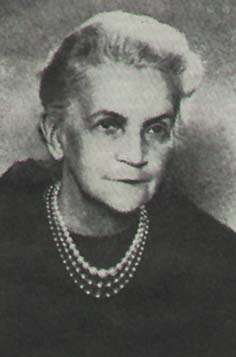Maria Jadwiga Ossowska (née Niedźwiedzka) is one of the most famous women of Polish science in the humanities. She dealt with philosophy, psychology, sociology and history, defined the subject of the study of morality and wanted to recognize it as a separate discipline. Her works were extremely popular not only in Poland, but also in foreign university centres (Oslo, Stockholm, Philadelphia, New York, Paris), and her reflections on intellectual honesty enlivened academic discussions.
Ossowska was born in 1896 in Warsaw to an intellectual family. In 1921, she presented her doctoral thesis in philosophy at the University of Warsaw. In the years 1921-1923, she studied at the Sorbonne, and after returning to Poland, she became professionally involved with the University of Warsaw. Her interests quickly began to focus on the issue of morality; she believed that it should be separated from ethics because the latter only judges and recommends.
During World War II, M. Ossowska, together with her husband Stanisław (1897-1963), a sociologist, joined secret teaching. Like many other representatives of Polish science, the Ossowski family helped their Jewish colleagues. They joined the activities of the Council to Aid Jews Żegota. Their apartment served as a temporary shelter for Jews in hiding, waiting for false documents, and looking for an opportunity to leave Warsaw. Among the people who benefited from their help, there was a mathematician, Edward Szpilrajn (1907-1976, from 1940 Marczewski), later rector of the University of Wrocław.
Maria Ossowska was a person with leftist views, which, however, contrary to appearances, did not always facilitate her existence in communist People’s Poland. Although in 1945 a Department of Morality Sciences was created especially for her at the University of Łódź (from 1948 she worked again in Warsaw, at the University of Warsaw, and then at the Polish Academy of Sciences), but between 1952 and 1956 she was forbidden to teach. However, she was a very popular teacher among students, so she organized lectures and meetings in her own apartment. She contested the actions of the communist authorities by joining the Crooked Circle Club.
Her interest in the history of morality involved her in historical research, which resulted in research on the mentality of the past, including her “Chivalric Ethos and Its Variations” and “Bourgeois Morality”.
Ossowska, who died in Warsaw in 1974, is buried at the Powązki Military Cemetery.





